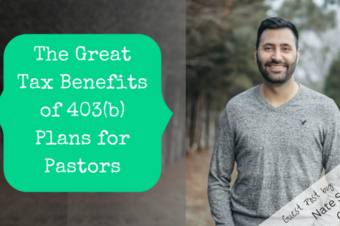
It’s a new year, a new calendar, and many are hoping, a new beginning, too. The sense of a fresh start with the new year leads a lot of people to make new year’s resolutions. How about you?
Since 51% of 2019 new year’s resolutions were to save money, I figure some of you are looking to tackle your finances this year and I want to help. Below, I’ve listed 15 different free resources ranging from budgeting systems and high-yield savings accounts to Social Security estimators and housing allowance tools. There’s quite a variety, so there’s something for everyone.
Basic Financial Management
Easy-To-Use Budget Template
The same study I referenced above found that 35% of new year’s resolutions were to stick to a budget. That’s a lot. Budgeting is the foundation of any successful financial life. It looks like people realize the importance of budgeting but they struggle to do it.
One of the reasons budgeting is hard is because you’re often trying to track 20+ different spending categories. I don’t know about you, but I can’t track that many things at once. That’s why I only have 2 kids.
Ben Wacek, CFP™, of Guide Financial Planning uses an innovative way of budgeting where you don’t have to do that. Instead of burning out attempting to track a bunch of different spending categories, you only focus on the handful that you really have control over. If you’ve ever struggled with budgeting, then you’ll love his system. You can download it in exchange for your email address here and he even made a video that will explain the whole process to you.
High-Yield Savings
Do you have your emergency fund sitting in a savings account earning 0.03% interest? You can do much better than that! If you transfer your money to an online high-yield savings account you can earn 60 times as much in interest. (No, that is not a typo. It is sixty.) The best part is that those accounts are FDIC-insured just like your current bank account, so you’re earning higher interest without taking on any additional risk.
Ally Bank is an online bank that offers high-yield accounts. If you click that link, they also have a great savings comparison tool that shows you the difference in interest earned among the most popular savings accounts. I moved my emergency fund from Bank of America to a CapitalOne 360 account and am now earning hundreds of dollars instead of just dollars in interest. It’s pretty cool.
Online Financial Management Tool
If organization is your priority this year, then Flourish Financial Planning has a great tool for you here. It’s a free online financial management tool where you can input all of your information to see your whole financial picture in one place. It also includes software that can help you visualize the effects of different financial situations and decisions you may be facing using your own personal numbers.
Unclaimed Property
Did you know that you may have money that you’re not even aware of? There are billions of dollars of unclaimed property out there. It could be anything from forgotten bank accounts and 401(k)s to unclaimed refunds or lawsuit settlements.
Each state has a database that you can search and you can access them all at Unclaimed.org. In addition to the 50 US states, that site also links to searches for Washington, DC, Alberta, British Columbia, Kenya, New Brunswick, Puerto Rico, Quebec, and the US Virgin Islands. Sadly, I don’t have any unclaimed property, but I found that my aunt has $40 in “misc unclaimed checks.”
Clergy Issues
Pastor’s Wallet Resource Page
A lot of you find your way to this website because you have questions about clergy-specific financial issues. There aren’t a lot of resources for pastors like you online, which is why I’m here. I just put together a brand new page chock full of free resources, including housing allowance and net worth calculators, downloadable housing allowance worksheets, a checklist for getting your finances in order, and several other housing allowance-related tools. You can check out the new page here.
Pocket Guide To The Clergy Housing Allowance
Another new resource I just created is the Pastor’s Wallet Pocket Guide To The Clergy Housing Allowance. The housing allowance is one of the most misunderstood and under-utilized financial opportunities for pastors. This is not a comprehensive guide (that would take a book, which I’m working on right now), but more of the Cliff Notes for the housing allowance. All of the most important information is presented in simple bullet points and easy-to-reference facts. It’s a special treat for those who sign up for my updates, so even if you’re already on my mailing list, go ahead and use the bar at the top of the page to get access.
Clergy Tax Withholding Calculator
One thing that gets more complicated when you become a pastor is your taxes. Because pastors are dual-status taxpayers, traditional tax calculators that you find online don’t always work. The people over at StartCHURCH had compassion on you and developed a tax withholding calculator designed for clergy and your unique issues. It’s even state-specific and you can check it out here.
Tax Resources For Pastors And Churches
Taxes are a big deal and it’s hard to find a CPA or tax professional who actually understands the intricacies of how they apply to pastors. Wayne Vinson, CPA of Vingroup, however, is well versed in taxes and how they apply to both pastors and churches. They have a resource page with helpful tax forms and a good Request for Housing Allowance that you can personalize.
Church Accounting Help
The fact that clergy taxes are complex and confusing is a thorn in the side of most church bookkeepers. Also, IRS rules regarding churches are different than for other organizations and there isn’t a lot of reliable information out there. Freechurchaccounting.com is a wonderful resource for anyone involved in church finance. The site has an amazing amount of information and, best of all, it is actually accurate!
Debt
Debt Repayment Calculator
When it comes to your financial life, debt is like a giant millstone that you have to drag around with you everywhere you go. It affects the calls you can answer and how you make financial decisions. Most people just pay their minimum payments and dream of the day that their debt will go away.
It doesn’t have to be that way, though. If you have specific goals in mind, then you can adjust your payments to allow you to reach those goals. This debt repayment calculator lets you look at debt repayment based on payment amount or desired payoff date. It also shows you how much interest is paid over time and how increasing or decreasing your balance would affect things. The calculator works for everything from credit cards to student loans.
Student Loan Income-Driven Repayment Calculator
When it comes to student loans, you often have various options for repaying them. The government has several different income-driven repayment plans that base your monthly payment on your income. This calculator, built by a family-focused financial planning firm, will show you what your payment would be under each program so that you can decide the best program for you and your family.
Investing & Retirement
Investment Calculator
Once you free yourself from the burden of debt, it is important to focus on saving for the future. This investment calculator, brought to us by the famous Dave Ramsey and crew, will show you what to expect of your investments based on your time horizon and expected returns. There are a lot of investment calculators out there, but I like this one because of the way it is laid out and the graphs it provides that show the power of compounding interest.
Dave likes to use a 12% rate of return for his calculations, but if you invest in anything other than stocks or use a target date fund, there’s a slim chance that you’ll get such high returns. It’s safer to be conservative in your estimates. Also, it’s important to remember the effects of taxes when looking at your final expected returns.
Social Security Retirement Estimator
In addition to your personal investments, Social Security benefits will be an important part of your retirement planning if you didn’t opt out or are eligible for spousal benefits. For planning purposes, you can use this estimator from the Social Security Administration to get an idea of what to expect. You should also review your Social Security earnings history regularly by setting up an account at ssa.gov to make sure they have the right numbers for your estimates.
Retirement Savings Calculator
If you want to calculate how much you need to be saving for retirement, then here is a calculator for you. You can input your age, your current income and savings, when you plan to retire, and how much you expect to receive in Social Security benefits. It will tell you how much you should be saving to reach your goals, in dollars and as a percentage of your current income. It shows a graph of how your money will grow and then be spent down in retirement and tells you how much more you’ll need to save if you put it off.
Retirement Withdrawal Calculator
There is a lot of focus on saving for retirement, but what happens when you actually retire? You have to switch things around and start spending down your accounts instead of saving into them. That can be really scary.
If you want to know how long your money will last you in retirement, then this calculator can help you. Enter the balance you will be starting retirement with, the interest you’ll be earning on the money, and how much you’ll be taking out each year. Then the calculator will tell you how long your savings will last. It’s a great calculator to play around with because you can look at the effects of increasing your savings or decreasing your retirement spending.
Professional Help
Sometimes things are beyond your DIY abilities and you need to consult with a professional to master your personal finances. Professional help is not free, but it can be more than worth it. If you’re at the point where you need to talk to a professional, you can find one here:
- XY Planning Network– These advisors are highly-trained Certified Financial Planner™ professionals who swear to work in their clients’ best interests and also offer virtual services so that your location doesn’t matter.
- Fee-Only Network– These are advisors who do not accept commissions, so their advice is less conflicted and more likely to be in your best interest.
- Garrett Planning Network– These are fee-only (no commission) advisors who are willing to work on an hourly basis.
- Kingdom Advisors– These are Christian financial professionals who have received in-depth training on the integration of the Bible with finance.



